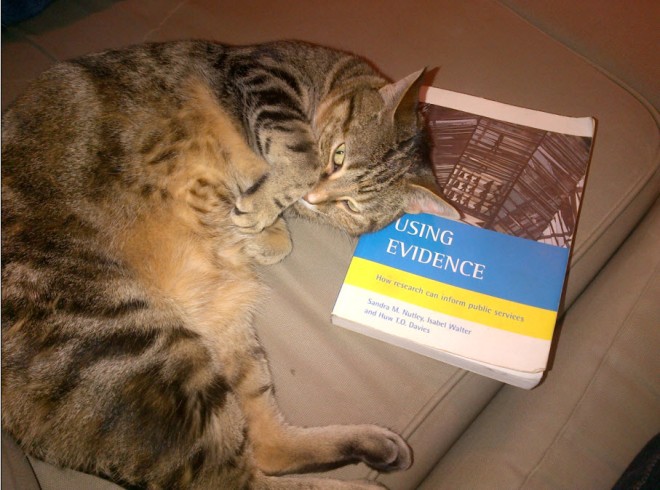By David Phipps, RIR York
My cat GoGo likes to interrupt my work. Whether she is sitting on me or sitting on my papers or competing with my laptop for my lap she is always interrupting my work.
But in this picture (below), GoGo also reminds me how valuable Using Evidence continues to be.
Sandra Nutley and her colleagues Isabel Walter and Huw T.O. Davies published their book, Using Evidence: How research can inform public services, in 2007. There has been TONS written on the broader subjects of knowledge mobilization, research utilization, implementation science etc since then but this book is truly a foundation for our work, especially for those of us working in social services and social policy. The book covers early concepts and hypotheses to contemporary approaches to enhancing the impact of research on policy and on services. I used Sandra’s book in a recent Open Access book chapter as part of the literature review (why do it myself when she has already done it for me). In that chapter, my co-authors Krista Jensen (@atomickitty) and Gary Myers (@KMbeing) and I articulated three take home lessons from the literature (there are more, but these were the three important to us at the time):
- KMb is a social process
- Efforts to enhance KMb need to be interactive and focus on the relationships between researchers and decision makers
- KMb happens at the level of the individual and is only beginning to emerge at the organization and the system/sectoral level
Even now, six years later KMb is still only emerging at institutional and systems levels. This underscores the currency of Using Evidence.
All that to say, if you haven’t read the book do so. It’s 33 pages of references means you don’t have to go anywhere else to find relevant literature up to 2007. It is foundational for our work. You can even get the book on Amazon.
I shared this picture with Sandra with whom I collaborated on a paper earlier this year. Thanks to our co-author Sarah Morton (@CRFRtweets) for writing about our article.
So let us know… how are you Using Evidence?


